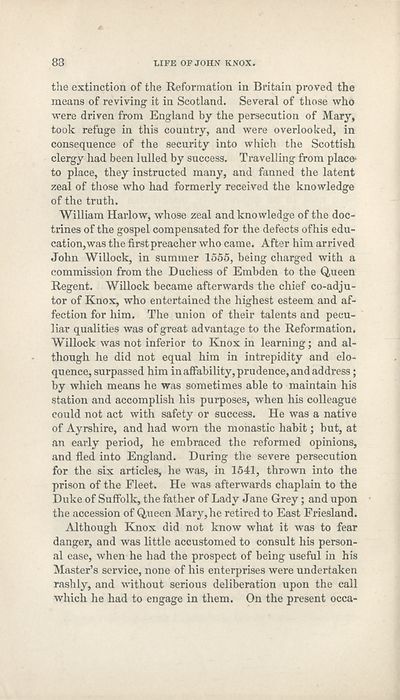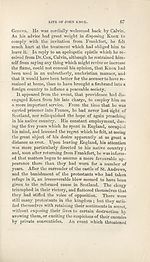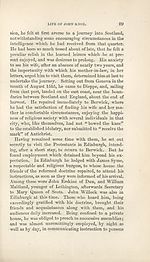Download files
Complete book:
Individual page:
Thumbnail gallery: Grid view | List view

LIFE OF JOHN KNOX.
the extinction of the Reformation in Britain proved the
means of reviving it in Scotland. Several of those who
were driven from England by the persecution of Mary,
took refuge in this country, and were overlooked, in
consequence of the security into which the Scottish
clergy had been lulled by success. Travelling from place-
to place, they instructed many, and fanned the latent
zeal of those who had formerly received the knowledge
of the truth.
William Harlow, whose zeal and knowledge of the doc¬
trines of the gospel compensated for the defects ofhis edu¬
cation,was the first preacher who came. After him arrived
John Willock, in summer 1555, being charged with a
commission from the Duchess of Embden to the Queen
Regent. Willock became afterwards the chief co-adju-
tor of Knox, who entertained the highest esteem and af¬
fection for him. The union of their talents and pecu¬
liar qualities was of great advantage to the Reformation.
Willock was not inferior to Knox in learning; and al¬
though he did not equal him in intrepidity and elo¬
quence, surpassed him in affability, prudence, and address;
by which means he was sometimes able to maintain his
station and accomplish his purposes, when his colleague
could not act with safety or success. He was a native
of Ayrshire, and had worn the monastic habit; but, at
an early period, he embraced the reformed opinions,
and fled into England. During the severe persecution
for the six articles, he was, in 1541, thrown into the
prison of the Fleet. He was afterwards chaplain to the
Duke of Suffolk, the father of Lady Jane Grey; and upon
the accession of Queen Mary, he retired to East Friesland.
Although Knox did not know what it was to fear
danger, and was little accustomed to consult his person¬
al ease, when he had the prospect of being useful in his
Master’s service, none of his enterprises were undertaken
rashly, and without serious deliberation upon the call
which he had to engage in them. On the present occa-
the extinction of the Reformation in Britain proved the
means of reviving it in Scotland. Several of those who
were driven from England by the persecution of Mary,
took refuge in this country, and were overlooked, in
consequence of the security into which the Scottish
clergy had been lulled by success. Travelling from place-
to place, they instructed many, and fanned the latent
zeal of those who had formerly received the knowledge
of the truth.
William Harlow, whose zeal and knowledge of the doc¬
trines of the gospel compensated for the defects ofhis edu¬
cation,was the first preacher who came. After him arrived
John Willock, in summer 1555, being charged with a
commission from the Duchess of Embden to the Queen
Regent. Willock became afterwards the chief co-adju-
tor of Knox, who entertained the highest esteem and af¬
fection for him. The union of their talents and pecu¬
liar qualities was of great advantage to the Reformation.
Willock was not inferior to Knox in learning; and al¬
though he did not equal him in intrepidity and elo¬
quence, surpassed him in affability, prudence, and address;
by which means he was sometimes able to maintain his
station and accomplish his purposes, when his colleague
could not act with safety or success. He was a native
of Ayrshire, and had worn the monastic habit; but, at
an early period, he embraced the reformed opinions,
and fled into England. During the severe persecution
for the six articles, he was, in 1541, thrown into the
prison of the Fleet. He was afterwards chaplain to the
Duke of Suffolk, the father of Lady Jane Grey; and upon
the accession of Queen Mary, he retired to East Friesland.
Although Knox did not know what it was to fear
danger, and was little accustomed to consult his person¬
al ease, when he had the prospect of being useful in his
Master’s service, none of his enterprises were undertaken
rashly, and without serious deliberation upon the call
which he had to engage in them. On the present occa-
Set display mode to:
![]() Universal Viewer |
Universal Viewer | ![]() Mirador |
Large image | Transcription
Mirador |
Large image | Transcription
| Antiquarian books of Scotland > Scotland/Scots > Life of John Knox ; and, The life of Alexander Henderson > (106) |
|---|
| Permanent URL | https://digital.nls.uk/131833576 |
|---|
| Description | Thousands of printed books from the Antiquarian Books of Scotland collection which dates from 1641 to the 1980s. The collection consists of 14,800 books which were published in Scotland or have a Scottish connection, e.g. through the author, printer or owner. Subjects covered include sport, education, diseases, adventure, occupations, Jacobites, politics and religion. Among the 29 languages represented are English, Gaelic, Italian, French, Russian and Swedish. |
|---|

